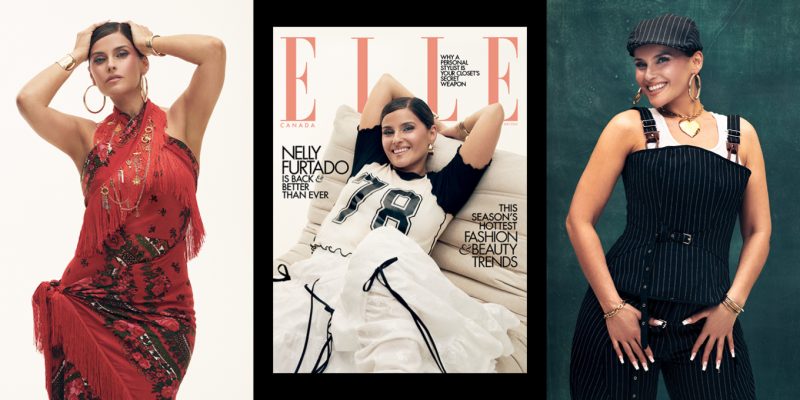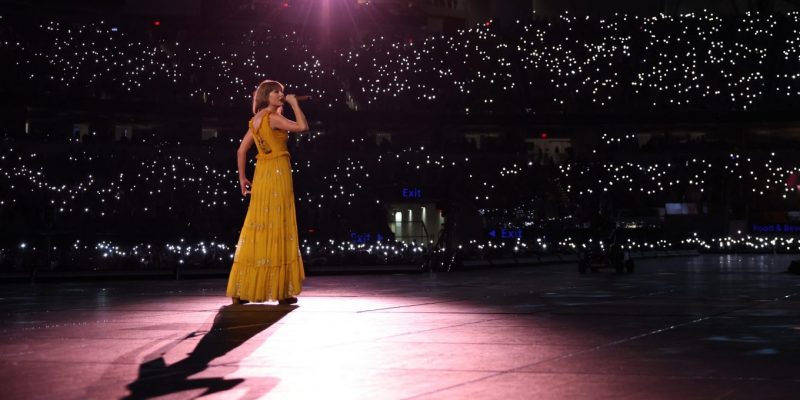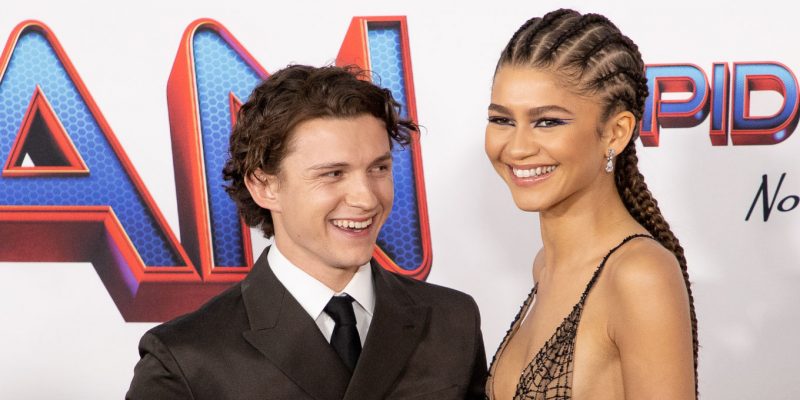Celebrity
Winnie Harlow and Stephan James Are Our September 2019 Cover Stars!
Actor Stephan James and model Winnie Harlow may have careers that have led them far away from home, but their connection to Toronto is stronger than ever. In our cover story, shot on the streets of Little Jamaica, we find out what it takes to walk a path of your own creation and go up against the odds and win.
by : Vanessa Craft- Jul 24th, 2019
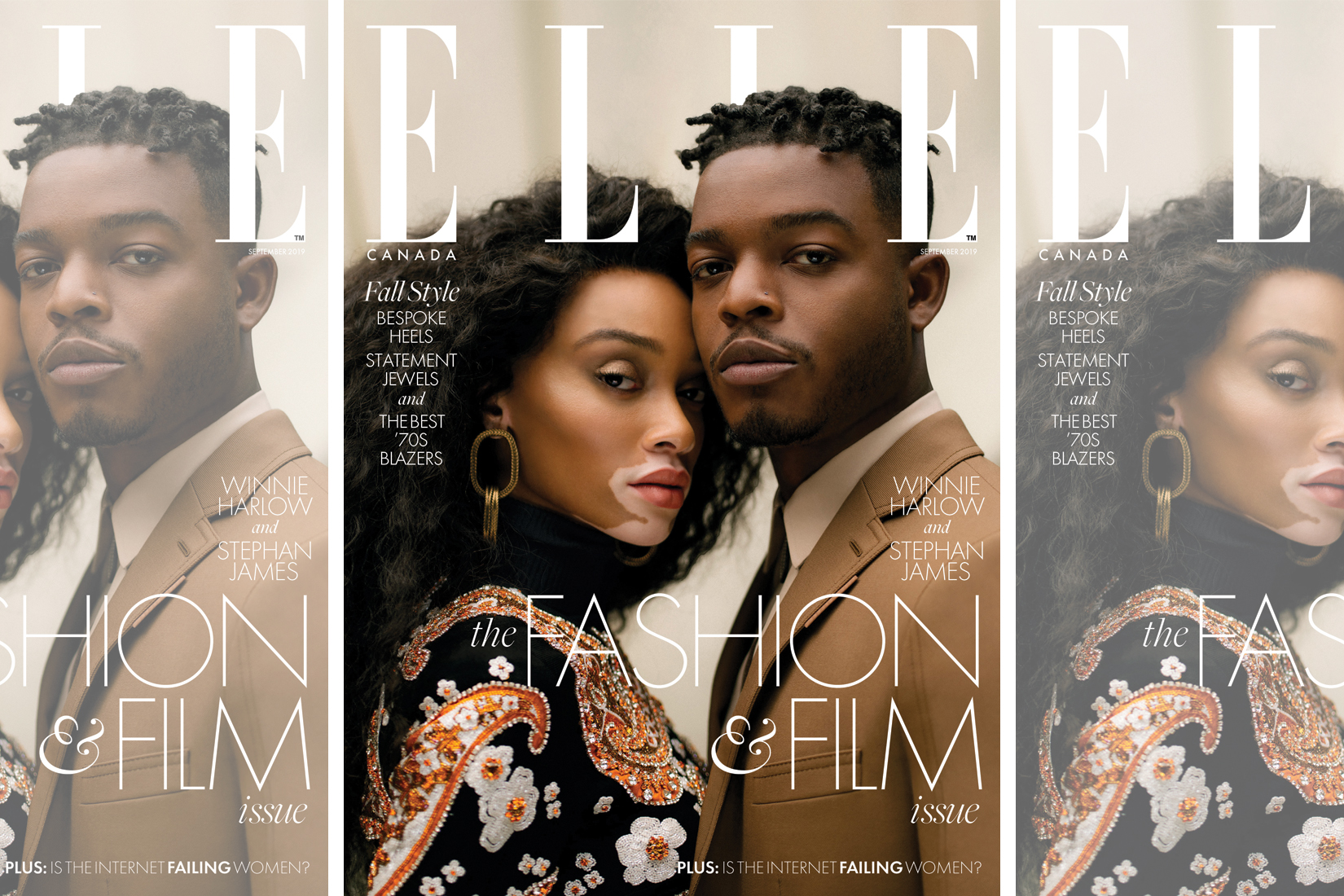
Winnie Harlow
Winnie Harlow is striding down Eglinton West in Toronto’s Little Jamaica like she’s on a runway in Paris. She’s wearing a floor-length houndstooth Chanel coat and not much else. Traffic has come to a halt as our photographer orbits her, and people passing by are scrambling for their phones so they can capture the moment. And this is definitely a moment.
Causing a gridlock is the norm for this indomitable, beautiful woman of humble beginnings, who hails from Malton, just outside of Toronto. Harlow’s first walk in the public spotlight, when she appeared in America’s Next Top Model in 2014, is barely a blip when compared to her recent achievements. In the past year alone, she became a brand ambassador for Tommy Hilfiger, appeared in the Victoria’s Secret show, made the Sports Illustrated Swimsuit issue, fronted a M.A.C Viva Glam campaign and appeared on the covers of magazines from as far afield as Taiwan, Indonesia and the Netherlands.
On our cover shoot, you can’t help but be moved by the attention and admiration Harlow is receiving from younger girls in the crowd—they are genuinely awestruck by the sight of her in their neighbourhood. During our set breaks, some clearly want to say hi to her but are too nervous to approach. The next morning, over breakfast at the tony St. Regis hotel downtown, I ask Harlow where she thinks that connection comes from. “I’m a regular ‘around the way girl,’” she says. “I am them, and they are me.” Being impressively glamorous yet grounded in realness at the same time—it’s not something many can claim. Harlow hasn’t forgotten where she came from. Her pride in her Jamaican-Canadian roots, her family, her friends and this city are an integral part of who she is personally and professionally. How does Harlow, who moved to London, England, in 2016 and now lives in Brooklyn, process being in the public eye? She admits she still isn’t used to it. “No matter where I go in the world, whenever people are screaming or anything like that, I actually get anxiety from it…I almost get kind of scared,” she says. “I think that people forget that we are strangers. It’s never going to be normal for people to be screaming. I’ll never get used to people always wanting pictures. Sometimes I want to wear my [hair] bonnet to the drugstore and pick up tampons. I don’t want to have to—have to—get ready and do my hair, do my makeup. Nobody wants to. You want to just walk outside without a bra…and go pick up some chips.”

The way Harlow speaks her mind and unapologetically self-advocates is something she gets from her beloved grandmother, who, according to Harlow, is no pushover. “I do appreciate the love; I appreciate the support,” she says. “But I always hear ‘Oh, you knew what you were signing up for.’ No, I signed up to pay my bills, I signed up to have a job, a career, to work—that doesn’t mean I’m obliged to be owned by the public. And I will never accept that. You don’t get to claim my life; you don’t get to own me because of my career.”
Speaking your mind isn’t easy in the modelling industry, especially if you are a woman of colour, but Harlow believes she owes it to herself. “I find it difficult; it’s not comfortable [for me],” she admits. “But the worst you can get is a ‘No.’ I’d rather go to sleep being proud that I stood up for myself and didn’t put myself in an uncomfortable situation—at work, in a relationship, whatever part of my life. I’ve realized that my happiness and my opinion of myself are more important than whatever anyone else has to say.”
Harlow recently celebrated her quarter-century birthday with blowout parties in Miami and Jamaica but says that she is a true homebody at heart (“I practise selective turn-up,” she says with a laugh) and that she’s just as likely to be found at home watching Netflix or Keeping Up with the Kardashians as on the dance floor. Beyond the small screen, Harlow and Kim Kardashian have become business partners: Harlow is launching a product line with KKW Beauty on September 6 that includes an eye palette and a highlighter. It’s the first time Kardashian has collaborated with someone outside her family and glam team on a project, which speaks to Harlow’s influence. The process was truly collaborative, over many meetings, usually at Kardashian’s house or even via FaceTime. “When I’m doing things I care about, I don’t just slap my name on it; I had a hand in the making of the products,” says Harlow, who admits to being “obsessed with makeup and skincare.”

On-set, I’m struck by how in control and self-assured Harlow is, striking pose after pose with intoxicating ease. Does she believe her success comes down to destiny? Or is it all down to free will? After a pause to consider her response, she says: “I feel like the world is a very black-and-white place—[there are] no grey areas, and I’m a very grey person. I believe that you create [your destiny]; there are things that are meant for you. But if you sit on the couch and don’t do anything…no. You have to work for it. It’s not magic! Nothing in life is easy; nothing just comes for free.”
She’s certainly putting in the time. Harlow’s schedule is, as they say, a lot. At the time of our conversation, she had recently been at the Cannes Film Festival, where she has been a gala fixture since 2017. “They love me in Cannes,” she says and then adds with a smirk, “I can’t speak French, but my French accent is poppin’.” But no sooner than she could say “Adieu,” Harlow was off on a whirlwind trip to Tokyo for Beautycon, a huge beauty festival that was held in Japan this year for the first time. She’s a diehard Raptors fan who regularly sits courtside when she’s in Toronto, but she had to watch the final from the other side of the world. Like the rest of the country, she’s still basking in the hometown pride of the team’s historic NBA win. “My God, it’s the first one ever!” Harlow exclaims. “It’s legendary! There was a time when no one was going to games—it was too painful. But over the past few years, it feels like the support from the city has gotten us further. That’s what love and support can do.” On a photo she posted on Instagram the night of the Raptors win, her caption says “So proud!” Proud indeed. Kind of like what the young girls on the street at our shoot might say about her.

Stephan James
Stephan James and I find each other on the first floor of Soho House, the members-only hot spot where everyone whispers, feigning calm, while keeping their head on a swivel lest they miss a celebrity sighting. Initially, James had wanted to take me to his old neighbourhood, Bay Mills, in the heart of Scarborough where he grew up with his mom and two brothers. But his trip to Toronto is brief, so we agreed to meet here, in the hub of premiere cast parties during TIFF. James had wanted to show me where he’s from, but instead, as it turns out, I am getting a look at where this gifted actor is headed.
The 25-year-old has, in just a handful of years, gone from humbly accepting a Rising Star award at TIFF to walking the red carpet last year as the lead in two high-profile premieres: acclaimed director Barry Jenkins’ If Beale Street Could Talk and the streaming-series Homecoming, an adaptation of the hit podcast of the same name, in which he starred opposite Julia Roberts as a war vet undergoing rehab. The buzz surrounding James, who’d previously scored supporting roles in Ava DuVernay’s Selma (and for which he attended a screening at the Obamas’ home theatre) and CBC’s miniseries The Book of Negroes, was suddenly deafening: He was nominated for a Golden Globe Award, and the Academy of Canadian Cinema & Television presented him with the first Radius Award, which recognizes Canadians in the industry making a global impact.
I ask James why he’d had his heart set on Scarborough for our meeting. “It’s where I spent the first 12 years of my life—three boys in a two-bedroom metro-housing apartment with my mom. It’s the foundation of who I am,” he says as we settle into a booth near the back of the dining room. “Even though my circumstances have changed, it’s very much a part of what made me me.”
Directors have praised James’ ability to portray complexity effortlessly, naturally. And in person, he has a calm form of charisma that is magnetic. He talks about destiny and purpose and picking up on energy with endearing conviction. James was such an admirer of writer-director Barry Jenkins’ work that he wanted a part in his next film, no matter what it was. He explains, quite seriously, that the role of Fonny in If Beale Street Could Talk, based on James Baldwin’s novel of the same name, was meant for him and only him. Even the name Fonny, he points out, is a nickname for Stephan. “Like a vision board come true,” I say and half-jokingly ask if he thinks he manifested getting the part. He says he did. “I’m very tuned into the universe. I don’t think that things are an accident—I got over that idea pretty early. Some jobs you actively take, but this job was always going to be mine.” And somehow, sitting here, with the midday sun streaming cinematically through the windows, I have to admit that I believe him.

“I’ve seen a lot of life,” says James. “I’ve been on the road pretty much since I was 18, visiting places I never thought I’d see.” Indeed, James has lived out of a suitcase for nearly a decade, having saved up from an early gig on Degrassi: The Next Generation to make the pilgrimage to Los Angeles for pilot season, staying as long as his rent money held out and hoping for a sustaining role. Living “on your lonesome” builds character, he says. The perspective one gains from learning that the world is much more vast than the square blocks you grew up in is also invaluable, I add. He agrees. Before you can get on a plane to Hollywood, you have to know that that option even exists.
Growing up, James watched his older brother, Shamier Anderson, carve out a path as a hardworking actor on the Family Channel. “He was the first person who made me believe it was possible to take this out of Scarborough and bring it somewhere else,” says James, who crackles to life whenever he speaks about his family. “I was able to visualize and see that it was tangible: If he could do it, I knew I could do it.” Unlike Anderson, James wasn’t a theatre kid. He was shy as a child, and he’s still reserved in a way that makes you constantly wonder what he’s thinking. “That feeling of shyness hasn’t changed,” he says. “But being quiet has helped me because it allows me to listen and observe. When you’re the loudest person in the room, you can’t hear.”

James lives in L.A. full-time now, but when he comes back to Toronto, his mom, Carmelita Anderson, is first on the list for a visit. “I was a star to her before I was a star to anyone else,” he says with a smile. (Visits with Mom come with another benefit: good Jamaican food. “Rice and peas, oxtail, jerk chicken…no one does it like my mom,” he says and then laughs. “I know: Every West Indian says that, but [in my case] it’s true.”) James is now a certifiable star in Hollywood as well. His unexpected casting in Homecoming drew attention partly because of his confident performance alongside a megawatt celebrity like Roberts and partly because the role was not prescribed as a “black role.” The character in the original podcast was raceless, sketched out in relation to his psychological pain and not his skin tone.
Getting the gig felt like a victory for James, who, like many black actors, carries the blessing and the burden of being a spokesperson for diversity with simultaneous pride and exhaustion. Earlier this year, for example, James was asked to take part in a Hollywood Reporter Drama Actor Roundtable alongside other actors like Sam Rockwell and Hugh Grant. Most of the questions directed at James centred around his place as a black actor in the industry. “Miles Teller gets to talk about acting, and I’m talking about diversity,” he says before letting out a long breath. “What separates me from him other than the fact that I’m black? I’ve worked on important projects like these actors have…and when I speak publicly, the conversation is often about diversity and the change in the industry. I’m happy and proud to be a part of that, but when are we going to talk about the craft?”
James cares deeply about his art, that much is clear. But he is pragmatic about the challenges he and his peers face. “There aren’t a lot of young black leading men in this new generation,” he adds. “I wish there were a thousand of us, to be honest. [White actors] get to do varied types of work, and I want [black actors] to be able to just exist and tell stories because you’re the best actor for the job—not just black-specific stories because you’re a black actor.”
Even with these current limitations, James is aware of the weight of his new-found power. “Every choice I make is so important—not only for me but for the rest of the game,” he says. “I could sit here and play period guys from the 1940s forever, but what does that do for me? What does that do for us? I don’t have that luxury.” James just wrapped filming the streaming-series #Freerayshawn in New Orleans for Sony Pictures and has also filmed the thriller 21 Bridges, out later this month, alongside Chadwick Boseman, Sienna Miller and fellow Canadian Taylor Kitsch.
Together with his brother, James created Building a Legacy in Acting, Cinema and Knowledge (B.L.A.C.K.), an initiative born out of a desire to build a launch pad for the next generation. They host a blowout party during TIFF to celebrate achievements, but the focus of the organization is on mentorship. “When we were coming up, there weren’t many black actors from here that we could look up to,” says James. “I kept thinking to myself, ‘Why do all my inspirations have to be from America?’ That really stuck with us. So Shamier and I thought: ‘Man, what if we’re those guys? Maybe we should celebrate the people we know are doing great things because if we don’t uplift ourselves, who will?’”
This story first appeared in the September 2019 Issue of ELLE Canada. Photography by Norman Wong; styling by Juliana Schiavinatto; creative direction, Annie Horth; art direction, Jed Tallo; hair, Janet Jackson; makeup, Leslie Ann Thomson (The Project); digital technician, Jeff Jamieson; photographer’s assistants, Luke Truman and Mikael Cosmo; styling assistant, Cherry Wang. Special thanks to Wisdom Barbershop and Hair Salon, Just Incredible, Raps and the Toronto Revellers. Click here to subscribe to ELLE Canada.
Newsletter
Join our mailing list for the latest and biggest in fashion trends, beauty, culture and celebrity.
More from Celebrity
Read Next
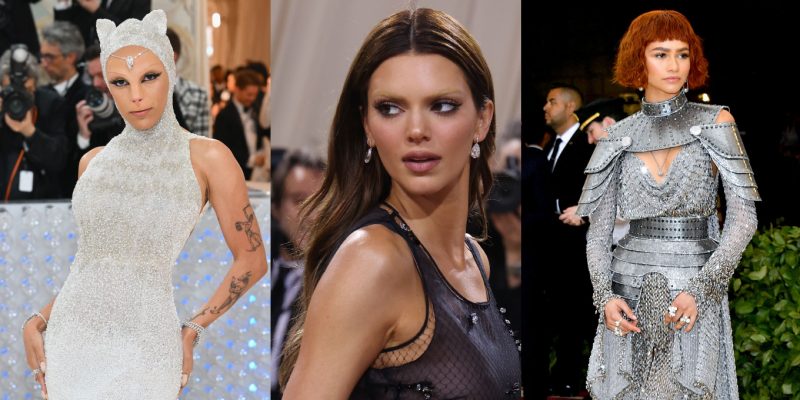
Beauty
The Best Met Gala Beauty Looks Of All Time
From Taylor Swift's 'Bleachella' era to Rihanna's iconic 2011 braids, meet the best beauty moments in Met Gala history.
by : Katie Withington- Apr 26th, 2024
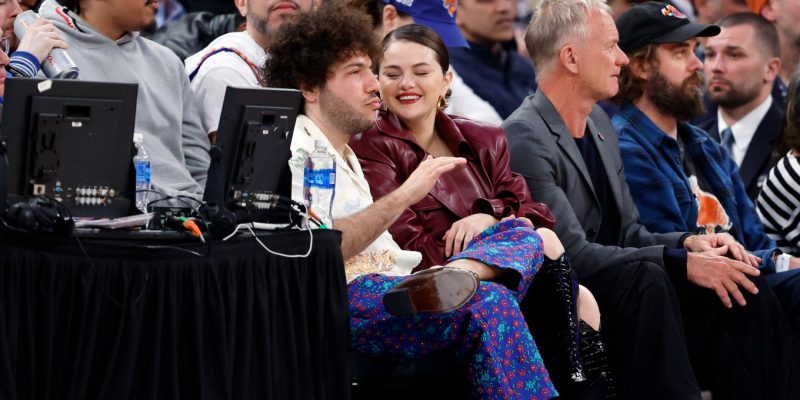
Culture
Benny Blanco Says He Fell in Love With Selena Gomez Without ‘Even Noticing’ It
Allow Benny Blanco to tell the straight-from-a-rom-com story of how he realized his feelings for his girlfriend and longtime friend.
by : Alyssa Bailey- Apr 26th, 2024
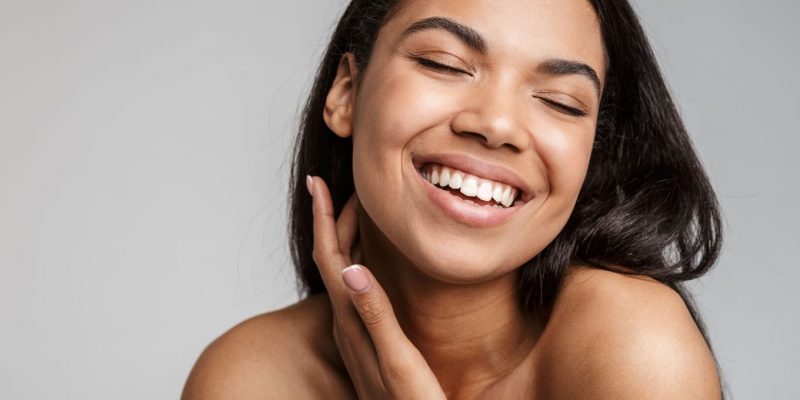
Beauty
ELLE Tried It: Five Serums to Up Your Skincare Game
Members of the ELLE team tested Avène Dermatological Laboratories’ five new concentrated serums. Here's what they thought.
by : ELLE Canada- Apr 25th, 2024

